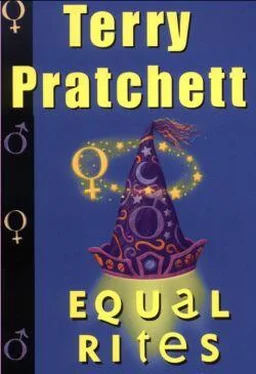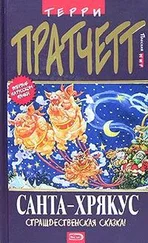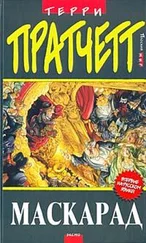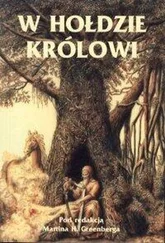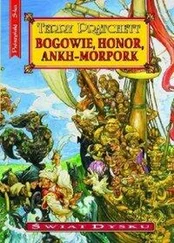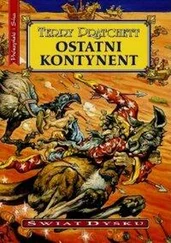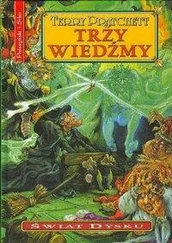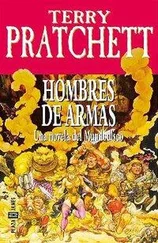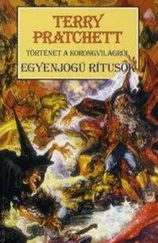Terry Pratchett - Equal Rites
Здесь есть возможность читать онлайн «Terry Pratchett - Equal Rites» весь текст электронной книги совершенно бесплатно (целиком полную версию без сокращений). В некоторых случаях можно слушать аудио, скачать через торрент в формате fb2 и присутствует краткое содержание. Город: New York, Год выпуска: 2000, ISBN: 2000, Издательство: Sagebrush Education Resources, Жанр: Юмористическая фантастика, на английском языке. Описание произведения, (предисловие) а так же отзывы посетителей доступны на портале библиотеки ЛибКат.
- Название:Equal Rites
- Автор:
- Издательство:Sagebrush Education Resources
- Жанр:
- Год:2000
- Город:New York
- ISBN:0613278089
- Рейтинг книги:5 / 5. Голосов: 1
-
Избранное:Добавить в избранное
- Отзывы:
-
Ваша оценка:
- 100
- 1
- 2
- 3
- 4
- 5
Equal Rites: краткое содержание, описание и аннотация
Предлагаем к чтению аннотацию, описание, краткое содержание или предисловие (зависит от того, что написал сам автор книги «Equal Rites»). Если вы не нашли необходимую информацию о книге — напишите в комментариях, мы постараемся отыскать её.
Equal Rites — читать онлайн бесплатно полную книгу (весь текст) целиком
Ниже представлен текст книги, разбитый по страницам. Система сохранения места последней прочитанной страницы, позволяет с удобством читать онлайн бесплатно книгу «Equal Rites», без необходимости каждый раз заново искать на чём Вы остановились. Поставьте закладку, и сможете в любой момент перейти на страницу, на которой закончили чтение.
Интервал:
Закладка:
Equal Rites
by Terry Pratchett
Thanks to Neil Gaiman, who loaned us the last surviving copy of the Liber Paginarum Fulvarum, and a big hallo to all the kids at the H.P. Lovecraft Holiday Fun Club.
I would like it to be clearly understood that this book is not wacky. Only dumb redheads in fifties’ sitcoms are wacky.
No, it’s not zany, either.
This is a story about magic and where it goes and perhaps more importantly where it comes from and why, although it doesn’t pretend to answer all or any of these questions.
It may, however, help to explain why Gandalf never got married and why Merlin was a man. Because this is also a story about sex, although probably not in the athletic, tumbling, count-the-legs-and-divide-by-two sense unless the characters get totally beyond the author’s control. They might.
However, it is primarily a story about a world. Here it comes now. Watch closely, the special effects are quite expensive.
A bass note sounds. It is a deep, vibrating chord that hints that the brass section may break in at any moment with a fanfare for the cosmos, because the scene is the blackness of deep space with a few stars glittering like the dandruff on the shoulders of God.
Then it comes into view overhead, bigger than the biggest, most unpleasantly armed starcruiser in the imagination of a three-ring film-maker: a turtle, ten thousand miles long. It is Great A’Tuin, one of the rare astrochelonians from a universe where things are less as they are and more like people imagine them to be, and it carries on its meteor-pocked shell four giant elephants who bear on their enormous shoulders the great round wheel of the Discworld.
As the viewpoint swings around, the whole of the world can be seen by the light of its tiny orbiting sun. There are continents, archipelagos, seas, deserts, mountain ranges and even a tiny central ice cap. The inhabitants of this place, it is obvious, won’t have any truck with global theories. Their world, bounded by an encircling ocean that falls forever into space in one long waterfall, is as round and flat as a geological pizza, although without the anchovies.
A world like that, which exists only because the gods enjoy a joke, must be a place where magic can survive. And sex too, of course.
He came walking through the thunderstorm and you could tell he was a wizard, partly because of the long cloak and careen staff but mainly because the raindrops were stopping several feet from his head, and steaming.
It was good thunderstorm country, up here in the Ramtop Mountains, a country of jagged peaks, dense forests and little river valleys so deep the daylight had no sooner reached the bottom than it was time to leave again. Ragged wisps of cloud clung to the lesser peaks below the mountain trail along which the wizard slithered and slid. A few slot-eyed goats watched him with mild interest. It doesn’t take a lot to interest goats.
Sometimes he would stop and throw his heavy staff into the air. It always came down pointing the same way and the wizard would sigh, pick it up, and continue his squelchy progress.
The storm walked around the hills on legs of lightning, shouting and grumbling.
The wizard disappeared around the bend in the track and the goats went back to their damp grazing.
Until something else caused them to look up. They stiffened, their eyes widening, their nostrils flaring.
This was strange, because there was nothing on the path. But the goats still watched it pass by until it was out of sight.
There was a village tucked in a narrow valley between steep woods. It wasn’t a large village, and wouldn’t have shown up on a map of the mountains. It barely showed up on a map of the village.
It was, in fact, one of those places that exist merely so that people can have come from them. The universe is littered with them: hidden villages, windswept little towns under wide skies, isolated cabins on chilly mountains, whose only mark on history is to be the incredibly ordinary place where something extraordinary started to happen. Often there is no more than a little plaque to reveal that, against all ecological probability, someone very famous was born halfway up a wall.
Mist curled between the houses as the wizard crossed a narrow bridge over the swollen stream and made his way to the village smithy, although the two facts had nothing to do with one another. The mist would have curled anyway: it was experienced mist and had got curling down to a fine art.
The smithy was fairly crowded, of course. A smithy is one place where you can depend on finding a good fire and someone to talk to. Several villagers were lounging in the warm shadows but, as the wizard approached, they sat up expectantly and tried to look intelligent, generally with indifferent success.
The smith didn’t feel the need to be quite so subservient. He nodded at the wizard, but it was a greeting between equals, or at least between equals as far as the smith was concerned. After all, any halfway competent blacksmith has more than a nodding acquaintance with magic, or at least likes to think he has.
The wizard bowed. A white cat that had been sleeping by the furnace woke up and watched him carefully.
“What is the name of this place, sir?” said the wizard.
The blacksmith shrugged.
“Bad Ass,” he said.
“Bad—?”
“Ass,” repeated the blacksmith, his tone defying anyone to make something of it.
The wizard considered this.
“A name with a story behind it,” he said at last, “which were circumstances otherwise I would be pleased to hear. But I would like to speak to you, smith, about your son.”
“Which one?” said the smith, and the hangers-on sniggered. The wizard smiled.
“You have seven sons, do you not? And you yourself were an eighth son?”
The smith’s face stiffened. He turned to the other villagers.
“All right, the rain’s stopping,” he said. “Piss off, the lot of you. Me and—” he looked at the wizard with raised eyebrows.
“Drum Billet,” said the wizard.
“Me and Mr. Billet have things to talk about.” He waved his hammer vaguely and, one after another, craning over their shoulders in case the wizard did anything interesting, the audience departed.
The smith drew a couple of stools from under a bench. He took a bottle out of a cupboard by the water tank and poured a couple of very small glasses of clear liquid.
The two men sat and watched the rain and the mist rolling over the bridge. Then the smith said: “I know what son you mean. Old Granny is up with my wife now. Eighth son of an eighth son, of course. It did cross my mind but I never gave it much thought, to be honest. Well, well. A wizard in the family, eh?”
“You catch on very quickly,” said Billet. The white cat jumped down from its perch, sauntered across the floor and vaulted into the wizard’s lap, where it curled up. His thin fingers stroked it absentmindedly.
“Well, well,” said the smith again. “A wizard in Bad Ass, eh?”
“Possibly, possibly,” said Billet. “Of course, he’ll have to go to University first. He may do very well, of course.”
The smith considered the idea from all angles, and decided he liked it a lot. A thought struck him.
“Hang on,” he said. “I’m trying to remember what my father told me. A wizard who knows he’s going to die can sort of pass on his sort of wizardness to a sort of successor, right?”
“I have never heard it put so succinctly, yes,” said the wizard.
“So you’re going to sort of die?”
“Oh yes.” The cat purred as the fingers tickled it behind the ear.
The smith looked embarrassed. “When?”
The wizard thought for a moment. “In about six minutes’ time.”
Читать дальшеИнтервал:
Закладка:
Похожие книги на «Equal Rites»
Представляем Вашему вниманию похожие книги на «Equal Rites» списком для выбора. Мы отобрали схожую по названию и смыслу литературу в надежде предоставить читателям больше вариантов отыскать новые, интересные, ещё непрочитанные произведения.
Обсуждение, отзывы о книге «Equal Rites» и просто собственные мнения читателей. Оставьте ваши комментарии, напишите, что Вы думаете о произведении, его смысле или главных героях. Укажите что конкретно понравилось, а что нет, и почему Вы так считаете.
